-
 Art of Wellness Acupuncture & Traditional Chinese Medicine (TCM)11704 Wilshire Blvd, Suite 295, Los Angeles, CA, 90025
Art of Wellness Acupuncture & Traditional Chinese Medicine (TCM)11704 Wilshire Blvd, Suite 295, Los Angeles, CA, 90025
myartofwellness@gmail.com310-451-5522 Office Hours
MonClosedTue7:30 am --4 pmWed7:30 am --4 pmThu7:30 am -- 4 pmFri7:30 am -- 4 pmSat7:30 am -- 4 pmSunClosedOur office opens from Tuesdays to Saturdays 7:30 am to 4 pm, will be closed on Memorial day, Independent day, Labor day, Thanksgiving day, Christmas and New year.
-
Recent Posts
- Chinese New Year 2026: Year of the Horse
- Acupuncture and TCM Treatment for Perimenopause Symptoms
- How to Treat Insulin Resistance With Acupuncture and TCM
- How to Treat Metabolic Syndrome With Acupuncture and TCM
- How to Treat Syncope With Acupuncture and TCM
- How to Treat Thoracic Outlet Syndrome With Acupuncture and TCM
- How to Treat Dupuytren’s Contracture With Acupuncture and TCM
- How to Treat Nutcracker Syndrome With Acupuncture and TCM
- How to Treat Rosacea With Acupuncture and TCM
- How to Treat Perioral Dermatitis With Acupuncture and TCM
- Lymphatic Drainage With Acupuncture and TCM
- How to Treat Turf Toe With Acupuncture
- How to Treat Nerve Pain With Acupuncture and TCM
- How to Treat Watery Eyes With Acupuncture and TCM
- How to Treat Ovarian Cysts With Acupuncture and TCM
- How to Treat Dystonia With Acupuncture and TCM
- Sign up to receive news and updates and get my free report:“The Top 10 Reasons to Try Acupuncture”

November 2025 M T W T F S S 1 2 3 4 5 6 7 8 9 10 11 12 13 14 15 16 17 18 19 20 21 22 23 24 25 26 27 28 29 30
Acupuncture
How to Treat Bronchitis With Acupuncture and TCM
By Xiaomei Cai, L.Ac., Ph.D. & Qineng Tan, L.Ac., Ph.D.

Chest cold with a productive cough, shortness of breath, coughing up mucus? These could be acute bronchitis symptoms. Acupuncture and TCM herbs can provide an alternative bronchitis treatment to help relieve chest congestion and a chronic cough.
Bronchitis is a respiratory infection in which the bronchial tubes, or airways, become inflamed. It typically causes chest congestion, a wet cough, coughing up phlegm, and difficulty breathing. Acute bronchitis usually develops due to the same kinds of viral infections that cause the common cold or pneumonia.
Chronic bronchitis refers to long-term inflammation of the lungs and bronchial tubes that is not related to an infection. If a person has a cough with mucus that lasts for months, or happens year after year, it is considered chronic bronchitis. This can happen as a result of smoking, and/or exposure to air pollution.
Like emphysema, chronic bronchitis is considered a chronic obstructive pulmonary disease (COPD). There are other lung conditions that can cause symptoms similar to those of bronchitis, including: asthma, sinusitis, whooping cough (pertussis) and tuberculosis.
Acute bronchitis usually clears up within a few weeks, but the persistent cough may linger. Antibiotics do not help treat viral infections, so the treatment for bronchitis is usually just to help suppress the cough and reduce aches and pains.
TCM treatment with acupuncture and herbs can help relieve bronchitis symptoms without side effects. It can also help remove pathogens and blockages affecting the lungs, so that bronchitis doesn’t turn into a chronic, recurrent condition.
Bronchitis Symptoms

Acute bronchitis causes the airways of the lungs—the bronchial tubes—to swell, and the lungs to produce extra mucus. Coughing, with clear or yellowish phlegm, is the primary symptom of bronchitis.
The most commons symptoms of bronchitis include:
- Cough, phlegmy cough, cough with mucus, productive cough, persistent cough
- Chest soreness, tightness in chest, chest pain
- Fatigue, feeling tired
- Shortness of breath, trouble breathing, wheezing
- Sore throat
- Stuffy nose, runny nose
- Body ache, headache, back pain, muscle pain
- Low grade fever
Is bronchitis contagious? It is not so much bronchitis as a condition—that is, inflammation and congestion in the lungs—is contagious, as the virus or bacterial infection that caused bronchitis to develop is contagious for a period of time. The coughing may last for a while beyond the infectious period. Sleeping can be difficult, because the cough tends to worsen when a person lies down.
Bronchitis Treatment
When you seek treatment for acute bronchitis from a physician, it is generally treated in the same way as the common cold. Recommendations will include:
- Rest
- Increase fluid intake, drink more water
- Take OTC pain relievers
- Take expectorants or cough suppressants to manage coughing
- Use a humidifier or sit in a steamy shower room to help relieve congestion
These remedies may help to temporarily relieve symptoms while a person gets over the infection. However, some of these medications can cause side effects, and they do not do much to help prevent bronchitis from coming back the next time a virus is going around.
Chronic bronchitis, as a COPD, is considered a chronic illness that must be managed, so as to slow its progression. Quitting smoking is the first recommendation. Then, bronchodilators, steroids, and/or antibiotics may be prescribed to help open the airways, reduce inflammation, and prevent recurrent infections.
These medical interventions, too, can come with significant side effects. Corticosteroids, in particular, if taken over a long period of time, can cause liver damage.
Making a major lifestyle change, like getting rid of a nicotine addiction, is easier said than done.
Fortunately, acupuncture and TCM herbs offer a complementary medicine to help relieve bronchitis symptoms, treat the deeper root causes, and also help with quitting smoking, if necessary.
Can Acupuncture Help Bronchitis?

According to TCM theory, bronchitis is the result of pathogenic forces like Wind and Dampness affecting the lungs and other organs systems that are interrelated. An acupuncturist looks for the particular patterns of symptoms in each individual, and tailors acupuncture treatment and herbal supplements, according to which organ system patterns are involved. These may include:
- Lung dampness
- Lung deficiency
- Lung dryness
- Phlegm-heat obstructing lung
- Wind invasion
- Spleen Qi deficiency
- Spleen/Kidney Yang deficiency
- Qi and/or Yin deficiency
Multiple studies have shown that acupuncture treatment and herbal cough preparations can be even more effective than conventional medicines when helping to relieve post-infectious chronic coughing.
Studies have shown that acupuncture can help reduce bronchial inflammation and damage, relieve coughing and reduce phlegm production. It can also help boost immune function.
One study detailed how patients with chronic bronchitis, who had been taking steroids for years, were able to reduce or entirely stop their use of steroids after receiving acupuncture treatments for a few months.
Chinese herbs, used in combination, can help relieve bronchitis symptoms and work on other levels, too. They can help clear toxins from the tissues and promote regeneration of new, healthy tissue, and improve immunity, so that the next time a virus is going around, the body is better equipped to fight it off quickly.
Top 5 Tips for Getting Rid of Bronchitis Naturally

Getting acupuncture treatment and specific herbs for your condition will be helpful. In addition, you can help strengthen your lung health by practicing these habits:
- Avoid dairy products, which increase mucus production
- Drink warm herbal teas, fresh ginger tea, and lemon water to help stay hydrated and thin phlegm. Avoid caffeine and alcohol, which dehydrate you. Ginger helps reduce inflammation.
- Steam an asian pear until very soft, and eat like applesauce. This helps clear mucus.
- Breathing exercises can be helpful; ask your acupuncture practitioner to show you some good breathing techniques.
- Take Yin Qiao pills at the very first sign of a cough or sore throat. This is a traditional Chinese formulation that helps ward off colds and coughs if taken early.
Acupuncture Near Me for Bronchitis in West Los Angeles
When a respiratory infection turns into a nagging cough, or worse, into chronic bronchitis that keeps coming back, year after year, it is important to seek treatment. With acupuncture and TCM herbs, it is possible to recover from a bronchial infection more quickly and comfortably. With regular acupuncture “tune-ups,” you can end the cycle of a chronic cough.
*This article is for education from the perspective of Traditional Chinese Medicine only. The education provided by this article is not approved by FDA to diagnose, prevent, treat and cure human diseases. It should not stop you from consulting with your physician for your medical conditions. Traditional Chinese Medicine is based on Qi, which is an invisible force that usually cannot be observed by modern science. Because science focuses on testing ideas about the natural world with evidence obtained through observation, these aspects of acupuncture can’t be studied by science. Therefore acupuncture and Chinese herbs are often not supported by double-blind, randomized trials, and they are considered alternative medicine therapies in the United States.
How to Treat Acne With Acupuncture and TCM
By Xiaomei Cai, L.Ac., Ph.D. & Qineng Tan, L.Ac., Ph.D.

Acne breakout, pimples, blackheads? Painful cystic acne and acne scars can affect your confidence and even lead to depression. Acupuncture and TCM provide an alternative skin care option to treat hormonal acne and clear up blemishes.
What causes acne? Acne is a skin condition in which bumps on skin form when hair follicles become clogged with dirt and oil. Sebum, the natural oil produced by skin glands, builds up in the pores and causes blockages. Pimples may appear on the face or other parts of the body (back acne, chest acne, bumps on arms, pimples on scalp/scalp acne, etc.).
Acne is most common during the teenage years, but people of any age can experience skin breakouts. Acne is also influenced by fluctuations in hormones, reactions to cosmetics or foods, weather, and perhaps most commonly, stress.
Rosacea is another skin condition that typically causes redness, flushing, and visible blood vessels on the skin, but it can also cause red bumps to break out, similar to acne. This is known as “acne rosacea.”
Everyone gets a few pimples at some point in their lives. However, severe acne that causes scarring can have a serious impact on a person’s confidence in daily life, as well as being physically painful.
There are many types of products and acne medication available, both over the counter or with a prescription, including: benzoyl peroxide, retinol for acne cream, acne patch, and acne face wash.
Topical treatment for acne may clear blemishes on a skin-deep level. Acupuncture and other TCM skin treatments can help get rid of acne and other skin problems, like rosacea, dermatitis, and eczema by addressing the root causes: hormonal imbalances, inflammation, and stress.
Types of Acne
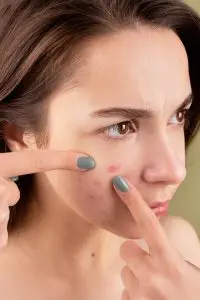
Acne blemishes can show up in different forms. The most commons types of acne include:
- Whiteheads – small, closed, white bumps that develop when a pore is clogged
- Blackheads – open bumps that are filled with oil and dead skin
- Red bumps on skin – papules are hard, red, inflamed bumps on skin
- Pustules – a papule that has a pus-filled tip
- Nodules – large, painful red bumps
- Fungal acne or bacterial acne – when red bumps are caused by bacteria or yeast clogging the follicles
- Acne rosacea – rosacea can cause acne-like breakouts in addition to red flushing
- Cysts or Cystic acne – large, painful, nodules that are deep down, under many layers of skin
Cystic acne is considered to be the most severe type of acne. The deep, inflamed cysts can get very big, last a long time, and leave permanent scars. Cystic acne may be genetic, as it tends to run in families.
Hormonal acne, which is also called “adult acne,” occurs because fluctuations in reproductive hormones like progesterone and estrogen and the stress hormone cortisol stimulate the overproduction of sebum. This kind of acne is most common among women in their 20s through their 40s.
Many women have breakouts that occur cyclically, coinciding with their PMS week or their period. Women may also experience pregnancy acne during the postpartum period. Women over 40 may have unexpected patches of pimples during perimenopause and menopause. Acne is also common among women with PCOS (polycystic ovarian syndrome).
Advanced Dermatology Acne Treatment
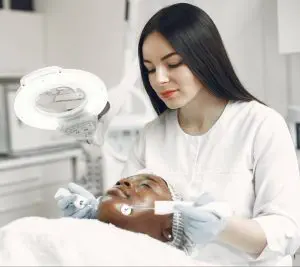
Dermatologists have tools that allow them to help remove pimples, known as acne extraction or blackhead extractions. Injections of corticosteroids can help reduce inflamed blemishes. Laser resurfacing can help minimize acne scarring.
A dermatologist can also provide acne medication. Cystic acne and hormonal acne will usually be treated with oral birth control pills to help manage hormone levels. Spironolactone is also sometimes prescribed; this is a diuretic, usually used to treat high blood pressure, that also has an effect on the hormones that control oil secretions.
Isotretinoin, also known as Accutane, is a medication used to treat severe acne, cystic acne, or nodules. Antibiotics are usually prescribed to help clear bacterial acne or fungal acne.
Many of these courses of treatment can cause unwanted side effects, and they do not get to the root cause of the hormone imbalance or internal toxicity.
TCM and acupuncture provide a way to get rid of acne that works from the inside out.
Can Acupuncture Help Acne?
According to TCM theory, skin problems reflect imbalances that originate deeper in the body. Heat and dampness are pathogenic forces that can take root in the organ systems. When heat “overflows” due to imbalances in the digestive or reproductive organs, the body tries to release some of the excess by allowing it to erupt out of the skin.
Acupuncture for acne can both help at the deeper, root level and on the surface of the skin.
We use meridian acupuncture points to target the internal organs that are creating toxic levels of heat or producing too much of some hormone. Then, we also use needles to stimulate the localized areas of the skin that are affected by the breakout and encourage healing.
Acupuncture treatment for acne will often focus on clearing heat from the stomach, intestines, liver, and lungs. This will help lead to fewer breakouts.
Acupuncture needles can be placed on the face where blemishes occur. The tiny “wounds” created by the very thin needles bring blood flow to the area and encourage the body’s repair and rebuilding mechanisms. The thin needles create a micro-trauma that brings blood flow to the area and encourages the body’s repair and rebuilding mechanisms to kick in. This is why acupuncture is also effective as an anti-aging treatment and a good alternative to botox injections.
One study showed a 94% effective rate for patients given 10 sessions of acupuncture for acne. A systematic review of acupuncture treatment for acne concluded that TCM offered an alternative with fewer side effects than conventional medical treatment.
TCM skin care for acne is highly individualized. An acupuncturist finds clues about which organ system is out of balance by observing the placement and appearance of recurrent breakouts, in addition to other symptoms related to digestion, hormone cycles, and emotional health. Cupping is another TCM treatment that can help draw out toxins and excess heat and improve circulation. Herbal supplements and dietary recommendations will be based on each person’s individual situation.
Top 3 Tips to Get Rid of Acne Naturally

Reducing stress is probably the most important thing you can do to help stop breakouts from happening. It is also generally advisable to avoid or limit spicy or greasy foods. Here are some of our best tips for clear skin.
- Start your day by drinking a cup of warm water with slices of lemon.
- Eat cooling foods and avoid foods that produce heat. Melons, mung beans, and radishes are top choices, along with lots of greens and purple-blue berries and plums.
- Try a homemade skin mask made from cooked, mashed dandelion greens. Apply for 20 minutes to get rid of blemishes and redness. Dandelion is a natural antibacterial and antifungal herb and is also good for the liver.
Acupuncture Near Me for Acne in West Los Angeles
Acne affects almost everyone at some point in their life. Breakouts can have a negative impact on your self-esteem, especially when we live in a culture that is so focused on appearances. The best acne treatment involves reduction of stress and inflammation, good nutrition, and restoring internal balance. At Art of Wellness we have over 30 years of experience helping patients heal skin conditions of all kinds.
*This article is for education from the perspective of Traditional Chinese Medicine only. The education provided by this article is not approved by FDA to diagnose, prevent, treat and cure human diseases. It should not stop you from consulting with your physician for your medical conditions. Traditional Chinese Medicine is based on Qi, which is an invisible force that usually cannot be observed by modern science. Because science focuses on testing ideas about the natural world with evidence obtained through observation, these aspects of acupuncture can’t be studied by science. Therefore acupuncture and Chinese herbs are often not supported by double-blind, randomized trials, and they are considered alternative medicine therapies in the United States.
How to Treat Encephalitis With Acupuncture and TCM
By Xiaomei Cai, L.Ac., Ph.D. & Qineng Tan, L.Ac., Ph.D.
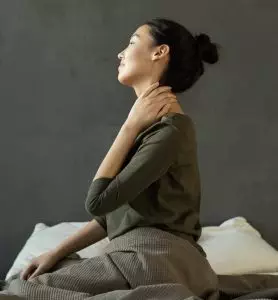
Headache, sensitivity to light, stiff neck, short-term memory loss? These could be signs of encephalitis, or inflammation in the brain. Infectious encephalitis can happen due to an infection; autoimmune encephalitis (AIE) is a type of autoimmune disorder. Acupuncture and TCM offer an adjunct treatment for encephalitis recovery.
What is encephalitis? Encephalitis refers to a serious condition in which the tissues of the brain become inflamed. It can happen to anyone, but is more common among children and older people.
The symptoms of encephalitis are sometimes ignored, because headaches, neck pain, and “brain fog” are so common and may not seem that serious at first. However, in combination, these signs should not be taken lightly. Like meningitis (inflammation of the membrane surrounding the brain and spinal cord), encephalitis can cause serious complications if left untreated. Encephalitis needs to be caught early and treated in order for people to make a full recovery.
What causes encephalitis? Brain inflammation can be caused by the body’s immune response to an infection, or due to an autoimmune disorder, in which the body produces antibodies that attack the brain tissues.
Top 10 Causes of Encephalitis
Viral infections are the primary reason that people develop encephalitis. These could be viruses carried by insects, especially mosquitoes, which are then contracted by humans through bites. Other communicable viral infections that pass from person to person through bodily fluids or close contact can also cause infectious encephalitis.
Infections that can lead to encephalitis include:
- Mosquito-borne viruses such as: West Nile Virus, Eastern Equine encephalitis, Western Equine encephalitis, St. Louis encephalitis, LaCrosse encephalitis
- Tick-borne viruses
- Rabies virus – can be contracted through being bitten by an infected animal
- Polio virus
- Herpes Simplex, Type 1 and Type 2 (HPV1 and HPV2)
- Epstein-Barr virus (mono, mononucleosis)
- Varicella Oster virus (chicken pox, shingles)
- Measles (rubeola)
- German measles (rubella)
- Mumps
There have been cases of people developing encephalitis as a complication of a COVID-19 infection.
Some cases of encephalitis can be caused by bacterial or fungal infections, or by a parasite. It could also be caused by exposure to some sort of allergen or toxin in the environment.
People with weakened immune systems—for example, due to HIV/AIDs—or who take immunosuppressant medications are at a higher risk for developing encephalitis.
Immunotherapy used to treat certain kinds of cancer, such as melanoma, ovarian cancer or lung cancer, has been shown to cause encephalitis in some cases.
Some cases of autoimmune encephalitis, called Anti-NMDAR encephalitis, appear to be related to a certain kind of tumor called a teteroma. In women and young women, especially, this can be an ovarian tumor that produces the antibodies for NMDAR.
Symptoms of Encephalitis
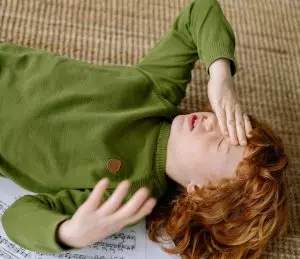
A mild case of encephalitis might only cause some flu-like symptoms that clear up within a few weeks. These types of symptoms include:
- Headache
- Stiff neck, neck pain
- Muscle aches, joint pain
- Fever
- Fatigue, feeling tired and weak
- Sensitivity to light
More severe symptoms of encephalitis can affect both cognitive and motor function:
- Mental confusion, brain fog, difficulty concentrating
- Memory problems, short term memory loss
- Hallucinations
- Seizures
- Severe headache
- Trouble with coordination or balance
- Loss of sensations in parts of the body or face
- Loss of muscle control in parts of the body or face
- Problems with speaking or hearing
- Mood swings, changes in personality
Anti-NMDAR encephalitis (when there may be an ovarian tumor involved, especially) can cause symptoms like pro-domal headache, nausea, and fever, which may then progress to more severe complications, including involuntary movements or tremors, urinary incontinence, rapid heartbeat, and psychiatric symptoms like anxiety, paranoia, or mania.
In severe cases, encephalitis can cause loss of consciousness and even cause a person to go into a coma. It is very important to seek urgent medical attention if you experience any of these symptoms.
Treatment for Encephalitis

Blood tests can confirm whether a viral or bacterial infection is causing encephalitis. Imaging tests like an MRI or CT scan may show the inflammation in the brain. A spinal tap may show an imbalance in cerebral fluids, or an EEG may show unusual electrical impulses in the brain.
However, there are times when these tests will not show exactly what is causing the encephalitis. As with many autoimmune disorders, it can be hard to pinpoint a clear diagnosis for autoimmune encephalitis (AIE).
Medical treatment for encephalitis will depend on what type it is determined to be. Mild inflammation will usually be treated with over the counter anti-inflammatory medications. Antivirals or antibiotics will be prescribed if a specific infection is found to be the cause. Steroids will often be used to help reduce inflammation. In more serious cases, a person may require breathing assistance or anti-seizure medications.
In cases where the cause is believed to be an autoimmune response, immunotherapy is used to try to interfere with the antibodies that are attacking the brain tissues. Steroids will be usually used in combination with other treatments. Plasmapheresis, or plasma exchange, removes some of these antibodies from the blood. Intravenous immunoglobulin therapy introduces healthy antibodies to block the action of the malfunctioning antibodies.
In cases of anti-NMDAR encephalitis where a tumor is present, treatment will include the removal of the tumor in addition to immunotherapy. Patients with this type of encephalitis may also be prescribed antipsychotic drugs to relieve psychiatric symptoms.
Immunotherapy works for some patients, but not all. Many patients will be offered second-line treatments such as monoclonal antibodies or antimetabolites. In some cases, people may seem to recover from encephalitis for a while, and then have a relapse in which the inflammation flares up again.
Most people will need significant time and rehabilitation to help them make a full recovery from encephalitis. Some people will have long-lasting effects, such as memory problems, balance and coordination issues, speech problems, and emotional volatility.
Many of the pharmaceutical treatments available for encephalitis cause significant side effects and can even lead to more physical, emotional and mental health issues. Fortunately, acupuncture and other TCM modalities offer a way to reduce inflammation in the brain and help relieve encephalitis, as well as helping to offset any side effects from other medical interventions.
Can Acupuncture Help Encephalitis?

With acupuncture and Chinese herbs, we seek to treat the root cause and the various symptoms and complications of each condition according to recognizable patterns. This allows us to effectively treat some conditions, such as autoimmune diseases, neurological disorders, and inflammatory conditions that may not readily respond to conventional medicine.
In the TCM view, inflammation occurs because there is too much heat in the body. Yang energy provides the “fire” we need to keep the body warm and energetic. But, if there is an imbalance, and too much heat, this leads to conditions like fever, infections, and inflammation. So, we see pathogenic internal heat as contributing to encephalitis, in addition to outside pathogens like viruses or bacteria. To clear heat that is trapped or stagnant in the body, we will use specific herbs and cooling foods, along with acupuncture treatment and lifestyle changes to reduce physical and mental stress. TCM herbs can also be highly effective against bacterial and viral infections.
The motor control and cognitive problems that can result from encephalitis occur because the inflammation in the brain is affecting the functioning of the central nervous system. With acupuncture, we can help to reestablish connections and neural pathways.
Autoimmune disorders are still not well understood by Western medicine, but with acupuncture we can help to balance and regulate the immune system, so that it is not being inappropriately triggered. This is why acupuncture works well as an adjunct treatment for encephalitis and many other autoimmune disorders.
Acupuncture Near Me for Encephalitis in Los Angeles and West Los Angeles
It can be very difficult when you or someone you love is facing a serious illness and a long, difficult recovery. TCM offers a healthcare option that treats each person in a highly individualized and caring way. At Art of Wellness, we have over 30 years of experience helping people gain back their strength and mobility after suffering from conditions like encephalitis, meningitis, Lyme disease, Guillain Barré Syndrome, Myasthenia Gravis, and many others.
*This article is for education from the perspective of Traditional Chinese Medicine only. The education provided by this article is not approved by FDA to diagnose, prevent, treat and cure human diseases. It should not stop you from consulting with your physician for your medical conditions. Traditional Chinese Medicine is based on Qi, which is an invisible force that usually cannot be observed by modern science. Because science focuses on testing ideas about the natural world with evidence obtained through observation, these aspects of acupuncture can’t be studied by science. Therefore acupuncture and Chinese herbs are often not supported by double-blind, randomized trials, and they are considered alternative medicine therapies in the United States.
How to Treat Muscular Dystrophy With Acupuncture and TCM
By Qineng Tan, L.Ac., Ph.D. & Xiaomei Cai, L.Ac., Ph.D.
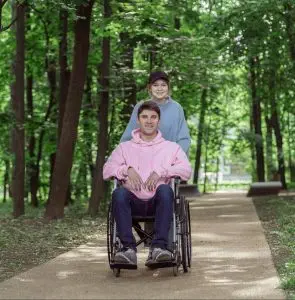
Progressive muscle weakness and muscle atrophy (loss of muscle mass) are the primary symptoms of Muscular Dystrophy. Acupuncture and TCM offer an alternative treatment to prevent muscle atrophy and treat complications of muscular dystrophy.
Muscular Dystrophy refers to a group of genetic muscle diseases that cause damage to muscles and lead to decreased flexibility and movement.
There are several types of Muscular Dystrophy. Some types of muscular dystrophy are more likely to show up during childhood, while others may develop later in life.
The most common type is Duchenne Muscular Dystrophy (DMD). Duchenne muscular dystrophy can lead to muscle wasting, limited mobility, and other complications with breathing and heart function. Duchenne most often affects boys and starts showing up in early childhood.
Becker muscular dystrophy is similar to Duchenne, but less common, and generally leads to milder symptoms of muscular dystrophy.
Muscular dystrophy of all types is caused by genetic mutations, usually inherited. These mutations affect muscular development and growth by blocking certain proteins in the body from performing their usual functions of building and maintaining muscle mass.
Muscular dystrophy is a progressive disease, which means that trouble with walking and other complications will get worse as a person gets older. Muscle weakness can affect the limbs and trunk, and can also affect the major internal organs, like the heart, lungs, and the muscles involved in swallowing. Muscles can shorten and tighten (contractures), causing them to pull on tendons and cause joint problems.
Both conventional medical treatments and alternative treatments are aimed at helping to slow the progress of the disease, maintaining maximum motor control, and keeping organs as healthy as possible.
Symptoms of Muscular Dystrophy
The signs and symptoms of muscular dystrophy vary, depending on the type of genetic mutation, and therefore, the type of muscular dystrophy.
The most common signs of muscular dystrophy include:
- Difficulty getting up from sitting or lying down
- Trouble walking, walking on toes, or waddling gait
- Falling frequently, stumbling
- Muscle pain, stiff muscles
- Enlarged calf muscles
- Learning difficulties, delayed development, difficulty concentrating
- Breathing problems, shortness of breath
- Heart problems, myocardiopathy
- Trouble swallowing
- Curved spine, scoliosis
- Drooping eyelids, vision problems, cataracts
Big calf muscles are common among people with DMD and Becker type muscular dystrophy. This is known as pseudohypertrophy, or calf hypertrophy, and is an abnormal development of the lower legs that happens in conjunction with the wasting of other muscles in the pelvis and thighs. With muscular dystrophy, healthy muscle can go through a pattern of inflammation that replaces healthy muscle cells with fat and scar tissue.
As people with muscular dystrophy age, they may begin to have more problems with respiratory function and/or heart problems like cardiomyopathy (scar tissue damage to the heart muscles) or arrhythmia (irregular heartbeat). Because the lungs are weaker, a person may be more susceptible to serious respiratory infections, like pneumonia.
Some kinds of muscular dystrophy can cause digestive problems, infertility, and cataracts.
Even amongst people who have the same type of muscular dystrophy, the symptoms and complications can look very different in each individual.
Top 6 Types of Muscular Dystrophy
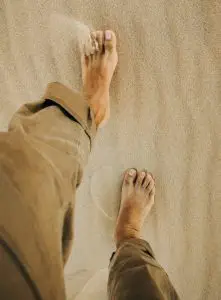
The different kinds of muscular dystrophy are caused by different genetic mutations that affect muscle development and function in different areas of the body. Some types show up early in life, and others may not develop until well into adulthood.
- Duchenne Muscular Dystrophy (DMD) – This is the most common type of muscular dystrophy, and occurs most often in boys, becoming apparent in early childhood. As a result, many young patients with DMD will show slow growth and motor development; they may walk late, tend to fall often, and have to use their hands more than usual to help them get up again.
- Becker Muscular Dystrophy – This type tends to begin the late teen or early adult years. Similar to DMD, a person will first notice weakness in the muscles, leading to more and more difficulty getting up and walking. Later, it can lead to heart problems.
- Myotonic Dystrophy – also known as DM (dystrophia myotonia). Categorized into 2 separate genetic disorders, DM1 (once known as Steinert disease) and DM2 (also known as Ricker syndrome, proximal myotonic dystrophy, or PROMM). DM develops in stages, and can affect the eyes, causing cataracts, and droopy eyelids. Uncontrollable muscle contractions (myotonia), muscle pain, and fatigue are other possible symptoms of myotonic dystrophy, as are hair loss, loss of facial expressions due to flaccid muscles in the face, and slurred speech.
- Facioscapulohumeral Dystrophy (FSHD) – a specific type of dystrophy that often develops slowly and can be difficult to diagnose. It can involve loss of muscle mass, starting in the face and spreading to the upper body, especially the shoulder blades, often affecting the body asymmetrically. People with FSHD may have trouble with small motor functions, like pursing their lips to drink, closing eyes all the way, weakness in the hands, difficulty picking up the feet when walking (foot drop).
- Congenital Muscular Dystrophy – CMD is a more general term referring to different kinds of muscular dystrophy that are apparent at birth, causing lack of muscle tone (hypotonia, or “floppy baby” syndrome), atrophy, contractures (shortening of muscles), scoliosis (curving of the spine), as well as respiratory problems.
- Limb-Girdle Muscular Dystrophy (LGMD) – a group of muscular dystrophies that primarily affect the muscles around the shoulders and hips.
Medical Treatment for Muscular Dystrophy
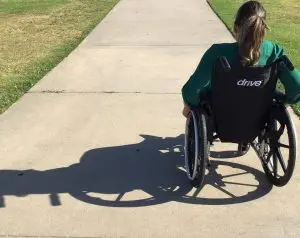
Muscular dystrophy can sometimes be difficult to diagnose. Other diseases, like ALS, multiple sclerosis, may also cause muscle weakness and atrophy.
People with muscular dystrophy need continual monitoring, and treatment options aim to manage the various symptoms and complications. Physical therapy, speech therapy, and occupational therapy can help people maintain as much flexibility, strength, and functionality as possible.
Steroids are often used to help maintain muscle and respiratory function, but many people with muscular dystrophy will end up needing to use aids, such as a cane or wheelchair, or a ventilator to help with breathing. Patients may need to be on heart medications to control blood pressure or arrhythmia. In some cases, surgery may be needed to correct severe contractures or scoliosis.
Acupuncture and TCM can be used as an adjunct to conventional treatments, and may help to maintain muscle mobility, improve pulmonary function, nervous system function, cognitive function, and to reduce inflammation.
Can Acupuncture Help Muscular Dystrophy?
TCM offers a different way of looking at disease. The conventional medicine view of muscular dystrophy is that it is an incurable genetic disease, and the progressive worsening of symptoms and complications stems from that.
In the TCM view, we see patterns of symptoms that show up in different ways in different people, according to their constitution. Long before we had a modern understanding of genetics, TCM observed that some people are born with deficiencies of certain types of organ Qi.
So, the TCM practitioner is looking for a pattern of symptoms, and how that interplays with a person’s foundational health. In the case of muscular dystrophy, it is not just that problems in the organ systems occur because of the progressive muscle atrophy; the dysfunction in the organs is occurring due to an inherited deficiency, and contributing to muscle atrophy.
When we see weak muscles, diminished muscle mass, and even paralysis, this falls under the category of Wei Zheng conditions.
Other Wei Zheng illnesses include:
- Ataxia
- Myelitis
- Myasthenia gravis
- Multiple sclerosis
Although they may have similar symptoms, different Wei Zheng illnesses can arise from problems with varying organs, including the liver, spleen, stomach, or kidneys. So, according to TCM, different types of muscle diseases require differentiated treatments.
TCM views muscular dystrophy as being related to an innate deficiency of Yuan Qi, or kidney energy. In Western medicine, the kidneys are thought to mainly have to do with the urinary system, but in TCM, “Kidney Qi” is a much broader concept.
Kidney Qi is inherited from our parents; it governs the growth and strength of the body. Kidney deficiency is also considered to affect cognitive function and memory, infertility, and hair loss.
Kidney problems are common among adults with DMD, but in medical science, it is considered to be a long-term complication of muscular dystrophy, as opposed to being foundationally related to it.
So, TCM diagnosis and treatment for muscular dystrophy will aim to strengthen the kidneys, spleen, and other organs, while also stimulating and nourishing the muscles, tendons, and nervous system.
The acupuncturist will look at the specific range of symptoms presenting in each person, and plan a treatment course to include modalities such as acupuncture, tuina massage, herbal supplements, and nutrition.
Everything is also affected by the environment and lifestyle. Foods that nourish the Kidney Qi, a regimen of gentle exercises, and meditation can help maintain better overall functioning.
A case study involving a woman with FSHD showed a significant improvement in facial muscle coordination after a course of acupuncture treatment.
A research study showed that acupuncture helped to slow the loss of muscle mass.
Acupuncture Near Me for Muscular Dystrophy in Los Angeles, Westside
At Art of Wellness Acupuncture and TCM in West L.A., we have over 30 years of experience helping people manage musculoskeletal pain and weakness of all kinds. Acupuncture treatment can help prevent the worsening of degenerative disease and improve well-being for people suffering from many types of chronic illness.
*This article is for education from the perspective of Traditional Chinese Medicine only. The education provided by this article is not approved by FDA to diagnose, prevent, treat and cure human diseases. It should not stop you from consulting with your physician for your medical conditions. Traditional Chinese Medicine is based on Qi, which is an invisible force that usually cannot be observed by modern science. Because science focuses on testing ideas about the natural world with evidence obtained through observation, these aspects of acupuncture can’t be studied by science. Therefore acupuncture and Chinese herbs are often not supported by double-blind, randomized trials, and they are considered alternative medicine therapies in the United States.
How to Treat Morton’s Neuroma With Acupuncture and TCM
By Qineng Tan, L.Ac., Ph.D. & Xiaomei Cai, L.Ac., Ph.D.
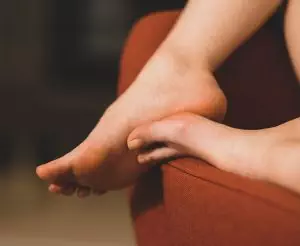
Do you feel like there is a pebble in your shoe all the time? Burning, tingling ball of foot pain? Tenderness between the 3rd and 4th toes? These could be symptoms of Morton’s Neuroma, a condition in which inflammation and swelling around a nerve in the ball of the foot causes toe pain and numbness. Acupuncture and Chinese medicine can help relieve Morton’s Neuroma foot pain.
Morton’s Neuroma is a problem related to swelling and thickening of tissue around a nerve in the foot. This nerve runs under the ligaments that connect the toe bones to the bones of the foot. A neuroma is considered to be a kind of benign tumor or growth and is usually not large enough to feel as an actual lump on the bottom of the foot.
Pain in the forefoot, or ball of foot pain, can be a sign of Morton’s Neuroma, or it could be a symptom of one of several other conditions, including:
- Metatarsalgia – a general term for pain and inflammation in the ball of foot, around the metatarsals. Pain symptoms can be similar to those of Morton’s Neuroma
- Capsulitis – irritation of the capsular ligaments in the foot can cause pain in the ball of the foot that comes and goes
- Gout – a type of arthritis in the foot or toes, caused by a buildup of uric acid
- Rheumatoid Arthritis (RA) – an autoimmune condition that causes arthritic pain that usually begins in the extremities
- Bunion pain – a bony bump that develops on the outside of the big toe joint
- Edema – swelling caused by fluid trapped in the tissues of the foot
- Arthritis – a general term for joint pain, which can affect the toes and feet
- Fractured bones in foot
- Bursitis – bursas are small sacs that act as cushioning for joints; there are bursae around the metatarsals that can become inflamed, causing ball of foot pain
- Tarsal Tunnel Syndrome – a condition where the tibial nerve is compressed in the tarsal tunnel area of the ankle, causing pain and tingling in the foot
- Radiculopathy – compression of a nerve in the lower back can cause pain in the foot, similar to sciatica
- Hammertoe – when one of the toes becomes bent, usually due to pinching shoes, and the muscles and ligaments can’t straighten it, causing swelling and pain
- Diabetes – foot pain and numbness (diabetic neuropathy) can happen due to diabetes.
It is possible for a person to have one of the conditions listed above, and also have a Morton’s Neuroma; sometimes another foot problem can contribute to the development of a neuroma.
Morton’s Neuroma Symptoms
The signs of a Morton’s Neuroma include:
- Ball of foot pain, especially when you put weight on in
- Toe pain or pain between the toes
- Numbness or tingling in the ball of the foot, “pins and needles” sensation
- Swelling between toes or in the ball of the foot
- Pain is better with rest, staying off of your foot
People often describe the sensation as feeling like there’s a pebble in your shoe or a wrinkle in your sock that is irritating, particularly in the area between the third and fourth toes.
Typically, the symptoms of neuroma begin to be noticeable when you are either engaging in an activity that aggravates the nerve, like running or playing a high-impact sport like tennis, or wearing shoes that force the ball of your foot to take extra impact. The pain and tingling may get better when you finish, take off your shoes, and rub your foot.
Over time, though, as the neuroma gets bigger, the pain may get worse and more persistent. If Morton’s Neuroma is left untreated, it can cause permanent damage to the nerve.
What Causes Morton’s Neuroma?

Morton’s Neuroma occurs due to compression of the nerve in the foot that carries sensory signals from the toes. Some people may be more prone to developing Morton’s Neuroma due to the shape of their foot, such as having an unusually high arch, or a very flat foot.
The way that the foot hits the ground and leaves the ground while walking or running can cause a lot of impact and stress to the ball of the foot. An injury to the foot or toes, or other type of trauma, can trigger this nerve condition, as can repetitive stress from a particular sport or other activity. Wearing high heels, flip-flops, or shoes that pinch the toes together can be a factor.
Morton’s Neuroma Treatment
A foot specialist, or podiatrist, will diagnose Morton’s Neuroma by feeling the ball of the foot to see if there is a noticeable mass and to sense what the pain and tingling symptoms are like for the patient. An ultrasound or MRI can show a soft tissue mass like a neuroma, and may be used to confirm the diagnosis.
Usually the first recommendations for a person with Morton’s Neuroma will be to change their footwear: choosing roomier shoes and softer, padded socks, etc. Orthotic supports may be prescribed.
Steroid injections may be used to relieve pain and swelling. If these measures do not help, surgery for Morton’s Neuroma can either be to cut ligaments and other nearby tissues to try to relieve pressure, or in some cases, the affected nerve itself may be removed (neurectomy). This can relieve pain; it can also reduce sensation in the foot permanently. There is also a chance with some surgeries that the neuroma may simply grow again.
Neuromas do not generally go away on their own. The most conservative treatment options for Morton’s Neuroma—like rest, icing, and different shoes—may or may not help to relieve the pain and tingling. Fortunately, acupuncture treatment is an excellent way to help relieve nerve pain.
Can Acupuncture Help Morton’s Neuroma Foot Pain?
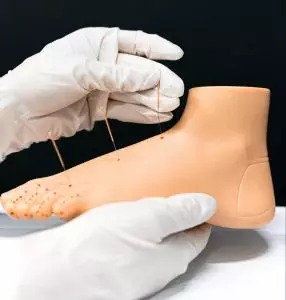
Inflammation and compression around nerves can cause nerve pain in many different parts of the body. For example, pinched or compressed nerves in the spine, or a herniated disc, can cause sciatica or piriformis syndrome: hip pain or pain that radiates down the leg. Compression of the plantar nerve can cause heel pain. A pinched nerve in the neck can cause shoulder pain and/or neck pain. Impingement of the median nerve causes carpal tunnel syndrome. An inflamed trigeminal nerve causes pain in the face. With acupuncture, we are able to provide treatments that can help relieve all of these types of nerve pain.
Acupuncture and other Chinese medicine modalities can help to reduce inflammation that presses on nerves, release scar tissue, and help to heal nerves and the irritated soft tissues surrounding them, like ligaments and muscles. Acupuncture also acts as an analgesic, reducing pain and increasing endorphins.
Evidence suggests that the stimulation of acupuncture points encourages the pituitary gland to release more cortisol, which plays an important role in reducing inflammation. It has been hypothesized that acupuncture influences the release of neuropeptides from nerve endings, which is also a key part of the inflammatory response.
According to TCM theory, this type of pain is often considered to arise due to “Bi Syndrome” conditions, in which stagnation of Qi and blood causes stiffness. The blockage of energy usually occurs due to pathogenic forces of “wind,” “cold,” or “dampness,” or some combination of these factors. Thus, the acupuncture practitioner will choose from a variety of methods including acupuncture, herbal supplements, moxibustion, and Tuina massage to clear obstructions that lead to pain and numbness, such as with Morton’s Neuroma.
Acupuncture Near Me for Morton’s Neuroma, Los Angeles Area
There are many different conditions that can cause foot pain and toe pain. It is important to seek care for foot problems promptly, so that they do not become worse. Acupuncture and other TCM treatments can help improve and maintain foot health for everyone, and can help manage and relieve many types of injury or disorders that affect the feet. At Art of Wellness near Santa Monica, we have 30 years of experience helping people stay active and on their toes.
*This article is for education from the perspective of Traditional Chinese Medicine only. The education provided by this article is not approved by FDA to diagnose, prevent, treat and cure human diseases. It should not stop you from consulting with your physician for your medical conditions. Traditional Chinese Medicine is based on Qi, which is an invisible force that usually cannot be observed by modern science. Because science focuses on testing ideas about the natural world with evidence obtained through observation, these aspects of acupuncture can’t be studied by science. Therefore acupuncture and Chinese herbs are often not supported by double-blind, randomized trials, and they are considered alternative medicine therapies in the United States.